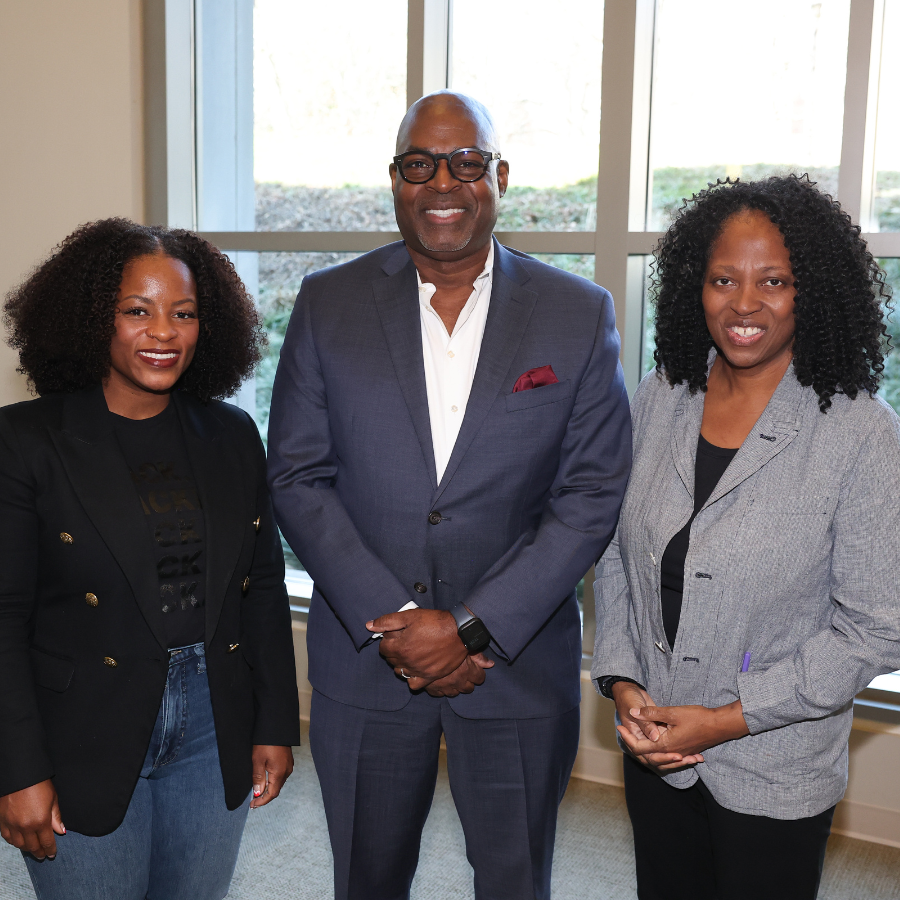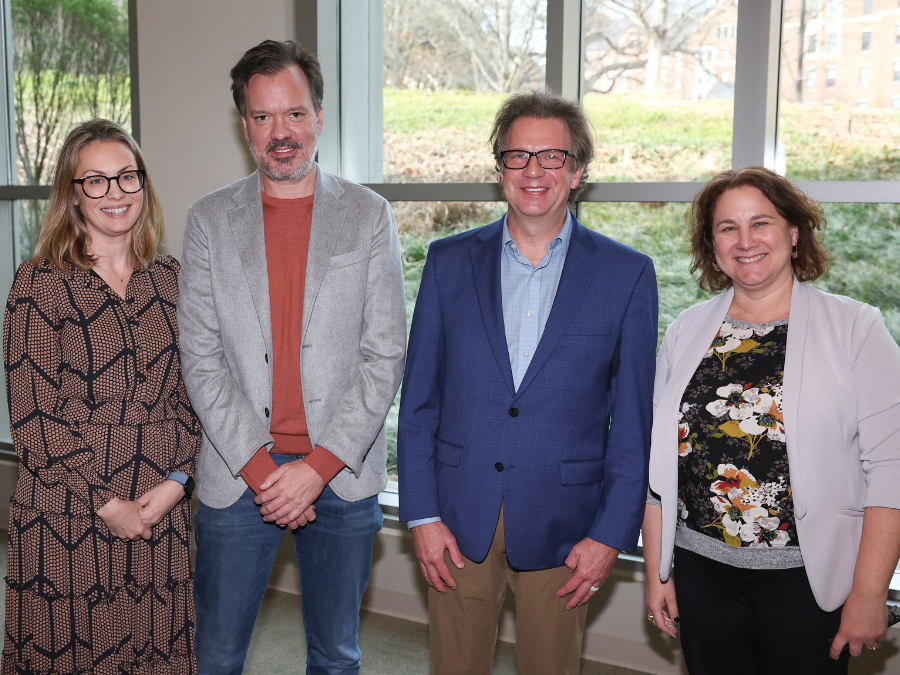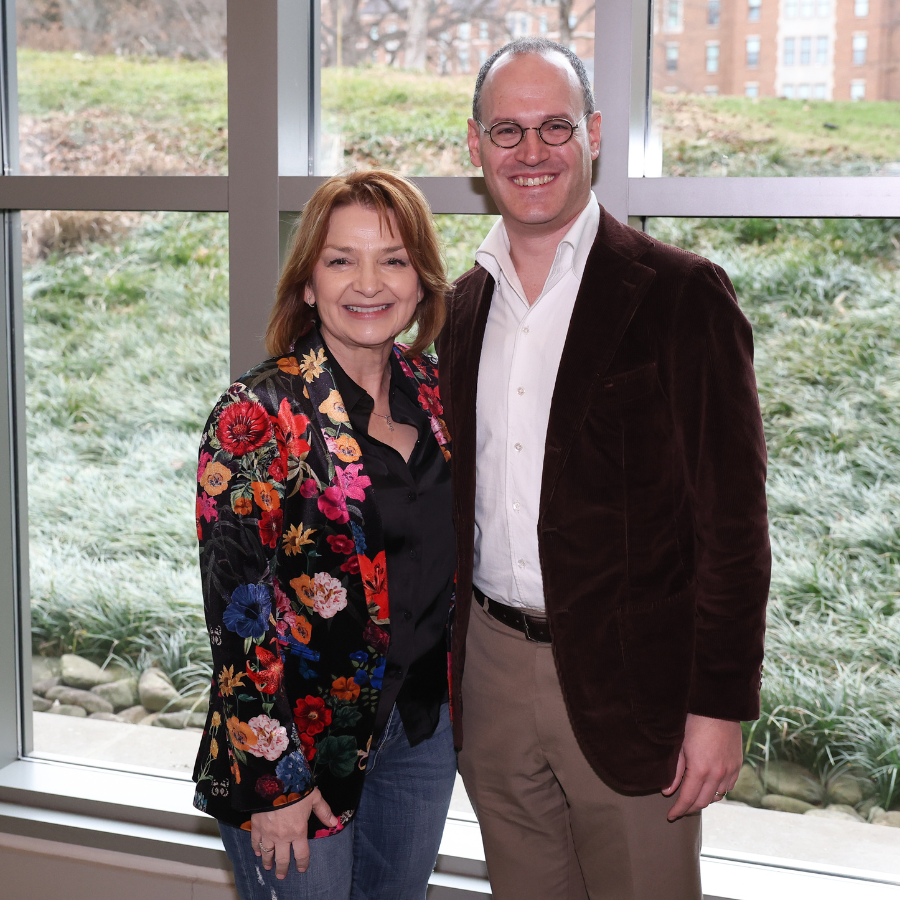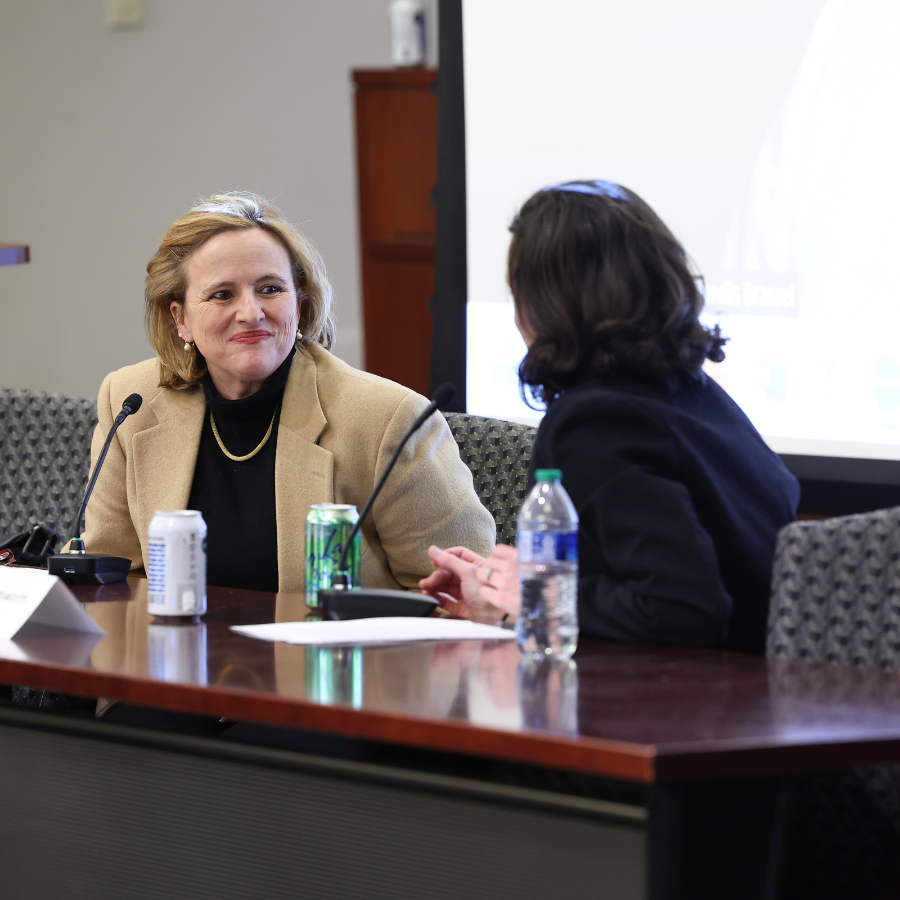By Madeline Knight ’24 and Rachel Davis ’25
On Thursday, February 8th, the Vanderbilt Journal of Entertainment and Technology Law (JETLaw) hosted its 2024 Symposium, Music Law in Music City. The event, sponsored by Shackelford, Bowen, McKinley & Norton, LLP, featured conversations between scholars, industry professionals, and a GRAMMY-winning musician on several key facets of the legal landscape in the music industry.
 Following opening remarks by Milton R. Underwood Chair in Law and JETLaw faculty advisor Professor Daniel Gervais, Editor in Chief Charlotte Yates moderated the first panel on Equity in Music. Professor Renee Nicole Allen, Associate Professor of Legal Writing and Faculty Director of the Center for Race and Law at St. John’s University School of Law, offered perspectives from her course, “The Music and the Movement: Race, Rhythm and Social Justice,” which analyzes the role of Black music in social justice movements and its legal implications. Professor Olufunmilayo B. Arewa, Senior Fellow for Entrepreneurship and Senior Scholar at George Mason University Antonin Scalia Law School, presented her research on the curation of Black culture and the impact of such curation on Black artists in the music industry. Loren Mulraine, Professor of Law and Director of Music and Entertainment Law Studies at Belmont University College of Law, emphasized two sources of inequity in the music industry: the law of copyright termination and the imbalance between creator and company in record deals. Zahr K. Said, Charles I. Stone Professor of Law at the University of Washington School of Law, discussed how the construction of copyright law itself in doctrines like fair use can exacerbate inequities in the music industry and suggested the importance of extralegal solutions like voluntary attribution to original authors.
Following opening remarks by Milton R. Underwood Chair in Law and JETLaw faculty advisor Professor Daniel Gervais, Editor in Chief Charlotte Yates moderated the first panel on Equity in Music. Professor Renee Nicole Allen, Associate Professor of Legal Writing and Faculty Director of the Center for Race and Law at St. John’s University School of Law, offered perspectives from her course, “The Music and the Movement: Race, Rhythm and Social Justice,” which analyzes the role of Black music in social justice movements and its legal implications. Professor Olufunmilayo B. Arewa, Senior Fellow for Entrepreneurship and Senior Scholar at George Mason University Antonin Scalia Law School, presented her research on the curation of Black culture and the impact of such curation on Black artists in the music industry. Loren Mulraine, Professor of Law and Director of Music and Entertainment Law Studies at Belmont University College of Law, emphasized two sources of inequity in the music industry: the law of copyright termination and the imbalance between creator and company in record deals. Zahr K. Said, Charles I. Stone Professor of Law at the University of Washington School of Law, discussed how the construction of copyright law itself in doctrines like fair use can exacerbate inequities in the music industry and suggested the importance of extralegal solutions like voluntary attribution to original authors.

Following this discussion, Professor Suzanne Kessler moderated a panel discussing Artists’ Rights and Organized Labor. Panelists discussed licensing rights, labor rights, copyright, posthumous rights, and more. Vanderbilt Law alum Sarah Luppen Fowler (‘08), Senior Deputy General Counsel at SAG-AFTRA, emphasized labor protections as a foundational component of establishing and safeguarding artist rights in the entertainment industry. Jen Jacobsen, Executive Director of the Artist Rights Alliance, explained the need for these protections to adapt in the wake of artificial intelligence disrupting the music industry for both consumers and artists. Ms. Jacobson mentioned legislative developments, like the Protect Working Musicians Act and the Ensuring Likeness Voice and Image Security (ELVIS) Act, that seek to protect individual music creators in negotiating music licensing terms with dominant online music distribution platforms. J.D. Connell, Senior Vice President of Media Licensing at SESAC, discussed the complexities of high-level negotiations with media companies that use digital media distribution systems on new and emerging platforms. David Black, a partner at Maynard Nexsen, shared the real-world effects of licensing, copyright, and posthumous rights on his litigation practice, including his representation of the “Godfather of Soul,” James Brown.
 Over the lunch hour, Robert S. and Theresa L. Reder Faculty Fellow and Professor of Law Joseph Fishman interviewed GRAMMY-winning songwriter, singer, and fiddler Tammy Rogers King of The SteelDrivers. Ms. Rogers spoke about her interactions with the legal industry throughout her musical career. She highlighted that contractual negotiations have been integral to the protection of her interests in many of her creative productions. She also described how the landscape of the music business, from radio to streaming, has changed over the years. Ms. Rogers noted the importance of musician-clients having an attorney who is a real music lover to properly safeguard their ownership and honor their creativity. For Ms. Rogers, ownership was described as an integral part of a fair and equitable music career, and navigating the legal landscape with the assistance of well-informed, passionate lawyers is a means to achieve that goal.
Over the lunch hour, Robert S. and Theresa L. Reder Faculty Fellow and Professor of Law Joseph Fishman interviewed GRAMMY-winning songwriter, singer, and fiddler Tammy Rogers King of The SteelDrivers. Ms. Rogers spoke about her interactions with the legal industry throughout her musical career. She highlighted that contractual negotiations have been integral to the protection of her interests in many of her creative productions. She also described how the landscape of the music business, from radio to streaming, has changed over the years. Ms. Rogers noted the importance of musician-clients having an attorney who is a real music lover to properly safeguard their ownership and honor their creativity. For Ms. Rogers, ownership was described as an integral part of a fair and equitable music career, and navigating the legal landscape with the assistance of well-informed, passionate lawyers is a means to achieve that goal.

To conclude the day, Associate Dean for Research and David Daniels Allen Distinguished Chair of Law Rebecca Allensworth spoke with Tennessee State Senator Heidi Campbell, Distinguished Professor of Social Justice at Loyola University New Orleans School of Law Imre Szalai, and Nashville entertainment lawyer Alandis Brassel about the growing legal issues surrounding live-event ticketing. Professor Szalai discussed the implications of binding arbitration clauses used by major ticket retailers and how traditional legal recourse may not reach those processes. He emphasized to students that legal creativity may be at the heart of reaching more just outcomes for consumers. In addressing these issues, Senator Campbell referenced both the bipartisan federal legislation seeking to safeguard artists and fans in the online ticket marketplace and Tennessee’s legislative efforts to regulate the ticket marketing and sales process for the benefit of all musicians and music-lovers. In addition to addressing the process itself, Senator Campbell discussed successful efforts to encourage transparency in ticketing pricing, working alongside major ticket sellers to ultimately benefit consumers and artists. Mr. Brassel elaborated on the relationship between venues, booking agents, and artists and offered his hopes for further collaboration between these entities to benefit all involved–for ticketing and beyond.
Madeline Knight is JETLaw’s 2023–2024 Executive Editor
Rachel Davis is JETLaw’s 2024–2025 Senior Symposium editor